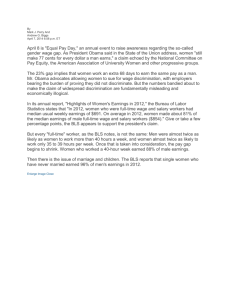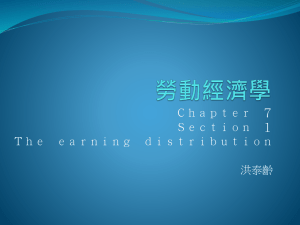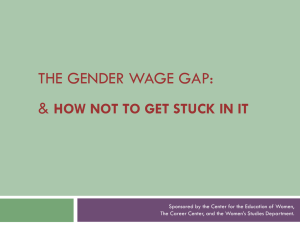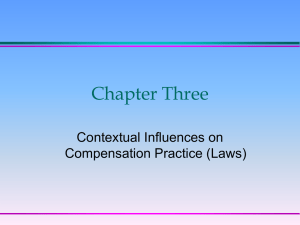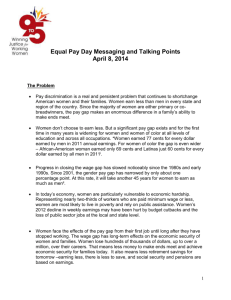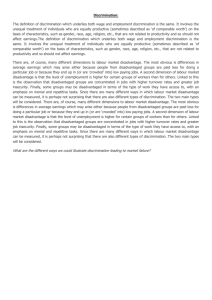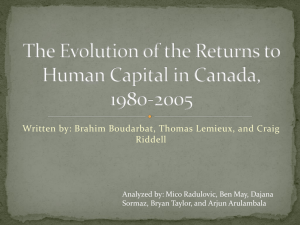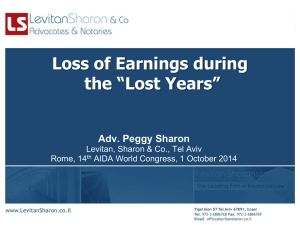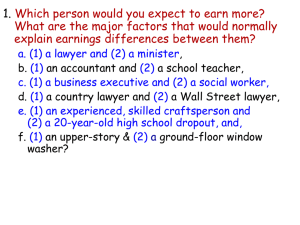Chapter_13_Micro_online_14e
advertisement
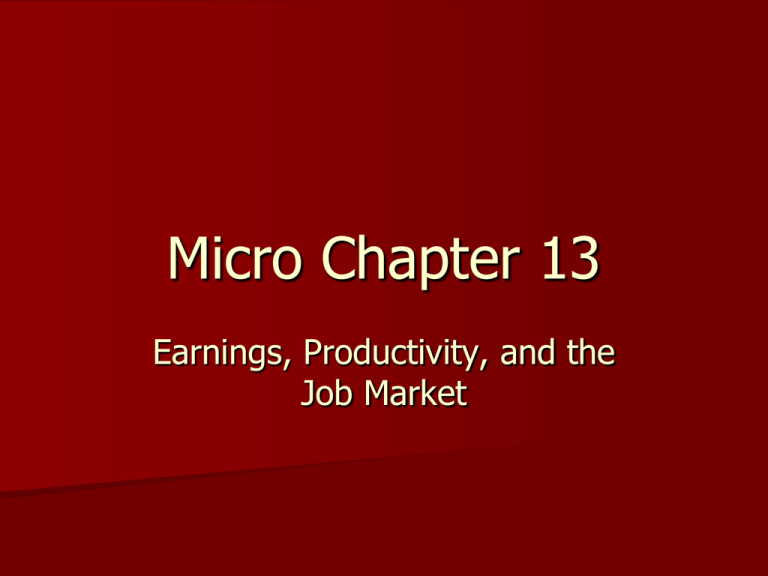
Micro Chapter 13 Earnings, Productivity, and the Job Market 3 Learning Goals 1) Determine the reasons why earnings differ between jobs 2) Analyze the practice of employment discrimination 3) Relate worker productivity to earnings Why Do Earnings Differ? Watch video: Monsters Inc-productivity Who would you pay more? Wages differ for two general reasons: (1) Differences in workers (2) Differences in jobs (1) Differences in workers: (a) Productivity – If MP increases, then MRP increases so the individual is more valuable to the firm (b) Preferences – Preferences can impact productivity (c) Race and gender – This is not necessarily discrimination – This can also increase wages – Examples: restaurant workers, interpreters, labor-intensive jobs Much of the earnings differential can be explained with supply and demand analysis Graph: Watch content video: earnings differential Watch video: 20/20 Myths- teachers are underpaid (2) Differences in jobs: (a) Compensating wage differentials – How much more salary do you require for: – A high risk job? – A job in an undesirable location? – Environmental factors? (b) Labor immobility You Think You’ve Got a Bad Job! A report on BBC World discussed the problems of gatherers of wild honey in the mangrove forests of Bangladesh. This is an extremely risky job- not because of problems with the bees that produce the honey- they’re pretty harmless. The problem is with the tigers that live in the swamps and that like to eat the honey (and also unfortunately the honey-gatherers whom they confront). Indeed, in the past summer alone tigers ate two of the roughly 400 honey-gatherers. Why would anyone take this kind of risk, a 0.5 percent chance each year of being killed on the job? The reason is that a honey gatherer can earn in three months what an agricultural laborer earns in a year. This 400 percent wage premium (a monthly wage four times that in agriculture) is a sufficient compensating wage differential to induce workers to face an annual risk of onthe-job death of 0.5 percent, far higher than the risk in any occupation in the United States. Q: Name at least two jobs that you think would require a compensating wage differential. Why? Watch video: Night at the Museumcompensating wage differential Q13.1 An individual who possesses a specialized skill that is difficult to execute will necessarily receive wages considerably higher than those who lack this skill. 2. receive a wage determined by the number of other persons possessing this skill. 3. receive a high wage only when this skill is in great demand relative to its supply. 4. receive a wage rate that is lower than similarly productive individuals who lack this skill. 1. Q13.2 Low-skill workers earn a lower wage than more experienced, higher skilled workers because the 1. 2. 3. 4. low-skill workers lack the intelligence necessary to do any other form of work. low-skill workers were never given the opportunity to invest in human capital. supply of low-skill workers is large relative to the demand for workers in this skill category. low-skill worker is too lazy to search for other employment opportunities. The Economics of Employment Discrimination Watch video: Stossel Micro Clip 11-wage discrimination Michael Lewis’s book Moneyball (New York: Norton, 2003, p. 115) provides an excellent description of the economic costs of discrimination (in the context of choosing and recruiting young baseball players): “The inability to envision a certain kind of person doing a certain kind of thing because you’ve never seen someone who looks like him do it before is not just a vice. It’s a luxury. What begins as a failure of the imagination ends as a market inefficiency: when you rule out an entire class of people from doing a job simply by their appearance, you are less likely to find the best person for the job.” As with discrimination generally, anyone who does not indulge in this sort of discrimination and is willing to enlarge the set of choices from which people can be recruited may reap tremendous financial gains. Q: Alan Greenspan, longtime head of the U.S. Federal Reserve, ran a very profitable consulting company before he took the Fed job. He hired only women economists, who unfortunately are generally paid less than men. His firm was very profitable. Why? Watch video: Freakonomics-name discrimination Read this section on your own and understand the conclusions: 1) After adjusting for productivity-related factors such as education and experience, there is much less discrimination than there appears to be 2) Usually, discrimination is costly and market forces will put discriminating firms at a disadvantage to compete Watch video: Freakonomics- name does not determine destiny Link Between Productivity and Earnings How can you increase productivity? (1) Increase nonhuman capital (2) Improve people’s skills (3) Advance technology Q13.3 Wages in the United States are higher than those in Mexico primarily because 1. output per worker is higher in Mexico than in the United States. 2. output per worker is higher in the United States. 3. the human and physical capital of American workers is lower than that of their Mexican counterparts. 4. all of the above are correct. Q13.4 The real wages of workers will tend to be high when 1. 2. 3. 4. output per worker is high. capital is scarce. industries are automating at a slow rate. profits are low. Q13.5 The linkage between high productivity and high earnings is vitally important because 1. it provides individuals with a strong incentive to develop skills and engage in activities that others value highly. 2. high productivity (a large output per hour worked) is the key to high living standards. 3. it brings the self interest of individuals into harmony with economic progress. 4. All of the above are true. Main points: 1) Higher output is the source of higher earnings 2) Increasing productivity is therefore the key ingredient to increasing earnings 2008 Median Earnings (Inflation adjusted, for population over 25 years old) Less than H.S. $20,268 H.S. Graduate (also GED) $27,479 Some College (or Associate degree) $33,447 Bachelor Degree $47,094 Graduate or Professional Degree $62,179 Question Answers: 13.1 = 3 13.2 = 3 13.3 = 2 13.4 = 1 13.5 = 4
